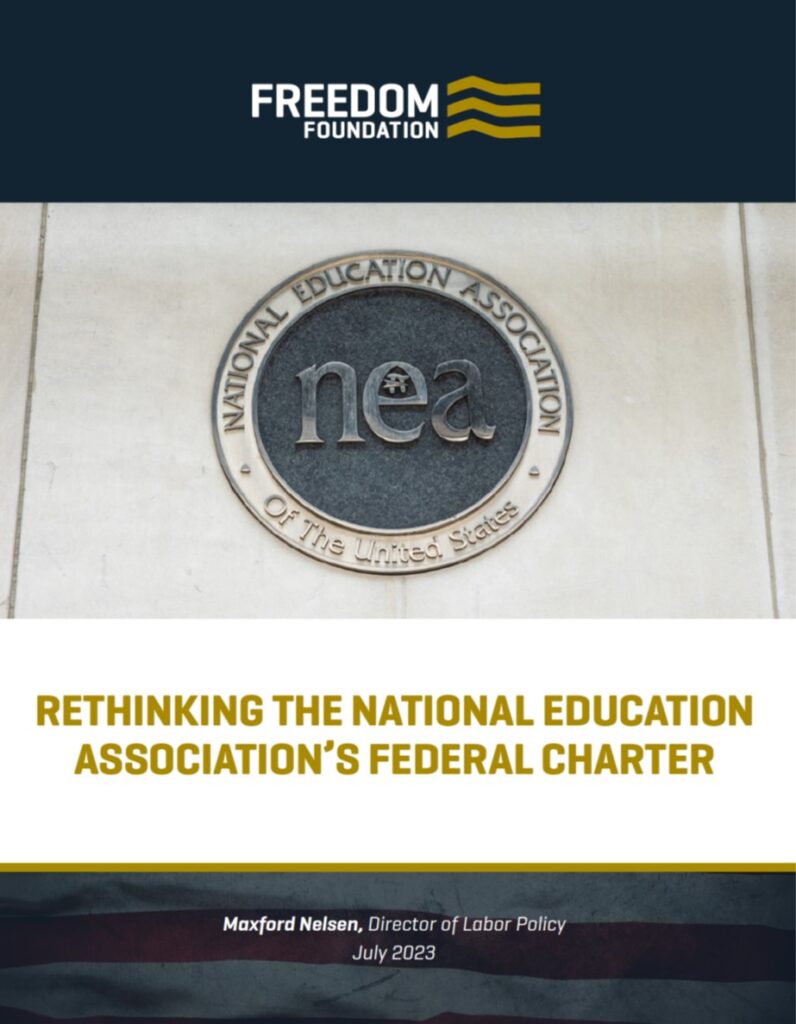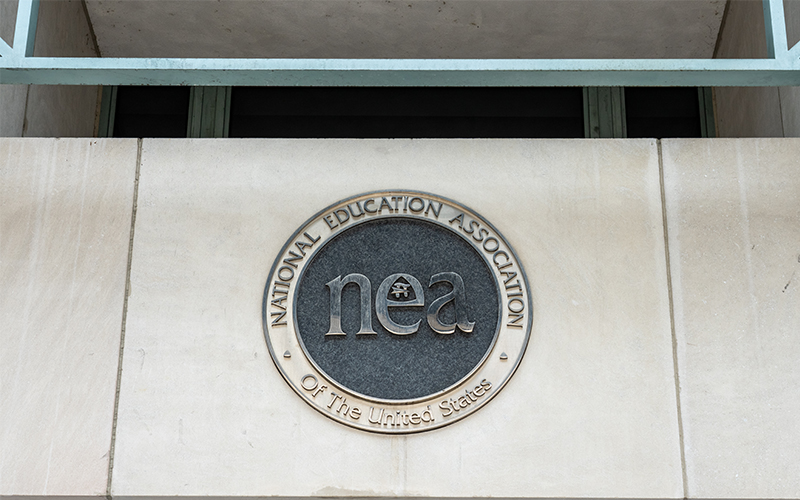Introduction and Summary
The National Education Association (NEA) is the largest teachers’ union in the country, with nearly 2.5 million working members nationwide in the 2021-22 academic year. The number of public school employees whose working conditions are determined by union contracts negotiated and administered by NEA affiliates is even greater, since not all NEA-represented employees choose to become members. That same year, the NEA headquarters in Washington, D.C., alone reported total revenue of more than $600 million, not counting the revenue retained by the NEA’s hundreds, if not thousands, of state and local affiliates. A political powerhouse, NEA undoubtedly exerts more influence over the policies and operations of American public schools than any other private special interest group.
Though the largest labor union in the country today, the NEA was originally incorporated in the District of Columbia in 1886 and functioned more as a professional association than a labor union until collective bargaining in government became widespread in the 1960s and ’70s.
In 1906, the NEA was granted a federal charter by an act of Congress. Today, a total of 95 “patriotic and national organizations” have received federal charters codified in Title 36 U.S. Code Part B. Many are household names, such as the Boy Scouts, the U.S. Olympic Committee, the United Service Organization (USO), Little League Baseball, and the Veterans of Foreign Wars.
Among such storied American institutions, the NEA stands out both as the only labor union with a federal charter and as a lightning rod for controversy given its partisan political advocacy and willingness to bring its ponderous weight to bear on nearly every significant subject dividing the country.
Further, unlike many federal corporate charters, the NEA’s charter is quite short and cedes to the union the ability to determine all substantive questions of its governance and operation through its own constitution and bylaws. The average length of a Title 36 charter is 1,010 words, while NEA’s charter is only 517 words, much of which deals with the granting and subsequent revocation of NEA’s D.C. real property tax exemption. In effect, the NEA enjoys the recognition a charter confers without having to abide by the limitations and regulations of many other federally chartered corporations.
In the 117th Congress, legislation was introduced in both the House and Senate to repeal the NEA’s federal charter. However, federal charters generally confer few practical benefits. As the Congressional Research Service has explained:
“Although the tangible benefits of a congressional charter are few, some national nonprofit groups have perceived that the prestige associated with this distinction might improve their standing, expand their membership rolls, and increase their fundraising.”
Additionally, revocation of the NEA’s federal charter would not strip the union of its corporate existence or meaningfully require it to alter its operations because its incorporation in the District of Columbia preceded, and exists concurrently with, its federal charter. Consequently, repealing the NEA’s charter would do little more than signal congressional disapproval of the organization.
Rather than repeal the NEA’s federal charter, Congress should amend the NEA’s charter to make the union less focused on partisan politics and more accountable to its members and the public.
Congress is well within its rights to revise or repeal a congressional charter, and it would not be unprecedented. Regarding corporations chartered under Title 36, the Congressional Research Service has noted:
- “…[C]hartered organizations might face greater future oversight risks if congressional committees were to conduct more active Title 36 charter oversight than they have in the past. A Title 36 charter does not, per se, require a corporation to be more responsive to congressional oversight. Should the committees find such a group to be unresponsive, however, they might elect to review its charter for potential amendment or repeal.”
- “By providing a perceived seal of approval to certain organizations without advance investigation and ongoing oversight, Congress and individual Members face a reputational risk in the event of a scandal.”
- “As public laws, charters may be changed through enactment of other public laws. At least one existing charter has been repealed through this process. The 1907 congressional charter of the National German-American Alliance of the United States of America was repealed in 1918 following extensive Senate Judiciary Committee hearings.”
If nothing else, there’s little dispute that the NEA of today bears little resemblance to the organization Congress chartered in 1906, much less other corporate entities with federal charters. The congressionally established purpose of the NEA, as expressed in its charter, is simply to “elevate the character and advance the interests of the profession of teaching” and to “promote the cause of education in the United States.”
By contrast, the NEA’s “goals” as stated in its governing documents and official filings are somewhat more expansive and include, among other things: Promoting “the health and welfare of children,” “defend[ing] public employees’ right to collective bargaining,” and promoting “human and civil rights”; providing “leadership in solving social problems” and supporting “its members as employees in disputes with employers”; and promoting “racial justice for our students, our communities, and our nation.” To achieve its expansive goals, the NEA has committed to using “all available means, including organizing, legal, legislative, electoral, and collective action.”
From supporting unrestricted increases to the U.S. debt ceiling, to opposing policies seeking to preserve and protect women’s sports, picking sides in the Israeli-Palestinian conflict, backing abortion without limit, and supporting gun confiscation, there is essentially no major policy debate in which the NEA does not seek to exert its considerable influence.
Given that the NEA has strayed from, or at least exceeded, the purposes established by its current federal charter, Congress should adopt the following package of reforms to the NEA charter that both incorporate provisions and regulations found often in other Title 36 charters and that are specifically tailored to NEA’s unique status as the only federally chartered labor union:
- Prohibit the NEA from engaging in electoral politics and lobbying.
- Prohibit the NEA from engaging in discrimination or employing quotas based on protected characteristics like race.
- Establish requirements for the maintenance and inspection of NEA’s corporate records.
- Require the NEA to submit an annual report to Congress.
- Fully repeal the NEA’s D.C. property tax exemption.
- Require NEA officers to be U.S. citizens.
- Require the NEA to maintain tax-exempt status.
- Require the NEA’s governance structure to be representative of its membership.
- Clarify the liability of NEA’s corporate officers.
- Establish the service of process upon the NEA.
- Prohibit the NEA from collecting dues from a public employee unless the employee has been notified of their right to refuse, and has affirmatively consented, and require the NEA to collect dues without the use of government payroll systems.
- Prohibit taxpayer-funded release time for NEA officers.
- Bar the NEA from incorporating the core tenets of Critical Race Theory into its governance, operations, and advocacy.
- Subject the NEA and its affiliates to the Labor-Management Reporting and Disclosure Act.
- Require the NEA to refrain from initiating, and to actively intervene to prevent, any strikes or work stoppages by its affiliates.
- Provide a mechanism to enforce the requirements of NEA’s charter.
- Specify the distribution of the NEA’s assets in the event of its dissolution.
Together, these reforms would help ensure the NEA lives up to the high ideals expected of federally chartered “national and patriotic organizations” and again becomes an institution Americans of all stripes can support with pride instead of the controversial and divisive political combatant it has become today.
The full report, “Rethinking the National Education Association’s Federal Charter,” is available below:









